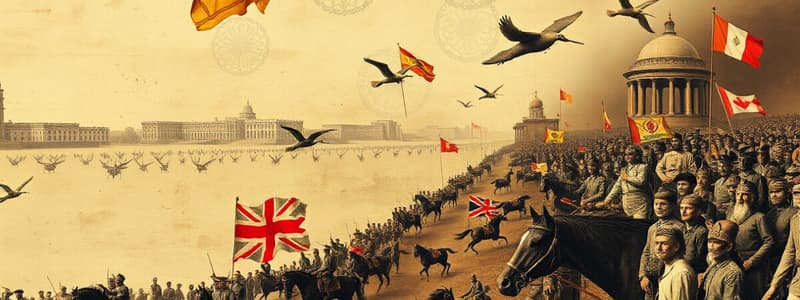Podcast
Questions and Answers
Why did the British come to India?
Why did the British come to India?
To trade
What did the British want a puppet ruler for?
What did the British want a puppet ruler for?
For trade concessions
What goods did the British trade in?
What goods did the British trade in?
Cotton, silk, spices
What was the most important resource for the British?
What was the most important resource for the British?
What did Nawabs say to the Company?
What did Nawabs say to the Company?
What was the Company's response to the Nawabs?
What was the Company's response to the Nawabs?
Who were the key figures in the Battle of Buxar?
Who were the key figures in the Battle of Buxar?
When was the East India Company made the Diwan of Bengal?
When was the East India Company made the Diwan of Bengal?
What was the impact of the East India Company assuming the Diwani?
What was the impact of the East India Company assuming the Diwani?
What problems did the Province of Bengal face that led to settlement systems?
What problems did the Province of Bengal face that led to settlement systems?
Which of the following were the introduced tax collection systems?
Which of the following were the introduced tax collection systems?
Flashcards are hidden until you start studying
Study Notes
Colonization and Trade Motivations
- British entered India primarily for trade, dealing in commodities like cotton, silk, and spices.
- Desire for a puppet ruler to facilitate trade concessions led to conflicts with local nawabs.
- The British claimed legal access to land to obtain agricultural resources, which were vital for trade.
Conflict with Nawabs
- Nawabs resisted British demands for concessions and tribute, maintaining local sovereignty.
- British accused nawabs of unjust demands harming trade, leading to military confrontations.
Battles of Plassey and Buxar
- Key figures: Mir Qasim (Nawab of Bengal), Shuja-ud-Daulah (Nawab of Awadh), Shah Alam II (Mughal Emperor).
- Battle of Plassey (1757) marked the British East India Company's rise to power in Bengal.
- Battle of Buxar (1764) further consolidated British control over key regions.
Diwani and Revenue Control
- The East India Company became the Diwan of Bengal in 1765 under Mughal Emperor Shah Alam II.
- The British administration prioritized increasing revenue from Bengal for trade financing.
- Aimed to control local authorities and maximize profits from goods like cotton and silk.
Economic Impact on Agriculture
- Diwani led to attempts to improve agricultural output, but new systems often failed.
- Farmers coerced into growing indigo, leading to the Blue Rebellion against oppressive practices.
Economic Crisis and Famine
- The company’s policies caused significant distress among artisans and peasants, resulting in mass desertion from villages.
- Bengal experienced a catastrophic famine in 1770, resulting in the death of approximately 10 million people.
Tax Collection Systems
- Introduction of various tax collection systems due to revenue challenges faced by the Company.
- Permanent Settlement, Mahalwari Settlement, and Ryotwari Settlement were implemented but faced numerous failures.
Key Figures in British Administration
- Robert Clive was instrumental in accepting the Diwani, establishing the Company as a powerful administrator in Bengal.
- Charles Cornwallis played a significant role in reforming tax policies and governance during British control.
Studying That Suits You
Use AI to generate personalized quizzes and flashcards to suit your learning preferences.



